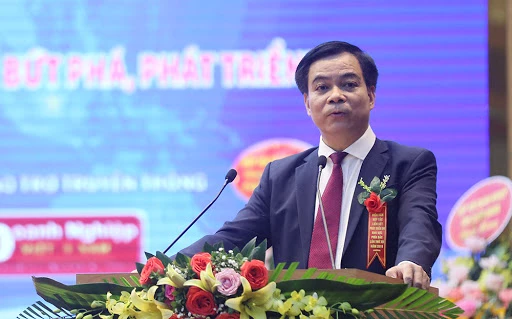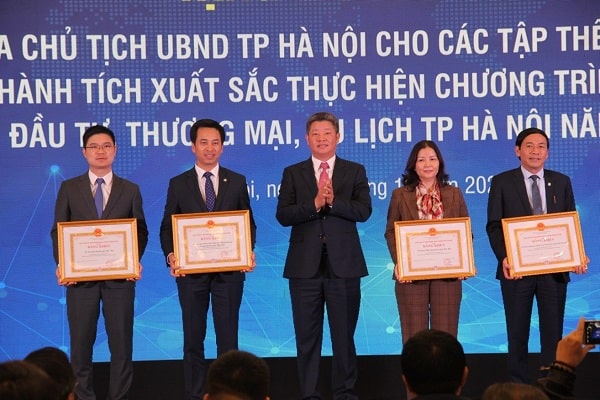Law on Supporting Small and Medium Enterprises: There is a big gap between policy and implementation
Ready for the 12th Cooperation - Connection and Business Development forum / On December 18, Northern businesses will voice their need for practical support

Mr. Nguyen Van Than - Chairman of VINASME read the opening speech at the forum.
On December 18, 2019 at the XII Regional Forum for Business Cooperation, Connection and Development, Chairman of the Vietnam Association of Small and Medium Enterprises (VINASME) Nguyen Van Than said that In recent years, the State has issued many policies to support private enterprises, of which the SME Support Law was a breakthrough. Since the Law came into effect, legal documents and guildlines have gradually been completed and implemented effectively. In the context of globalization, Vietnamese enterprises have gained good opportunities provided by trade agreements. In 2019, the economy achieved a high growth rate of 6.98% and a main contributor to this success was the business community, especially the small and medium-sized enterprises.
However, Mr. Than frankly pointed out some shortcomings of the Law since 2018. For instance, many localities have not yet allocated funding and chosen priority areas/sectors to support businesses. As one of the results, the accessability to bank capital and credit sources is very limited, while Logistic costs and other expenses are still high. These directly affects the ability to expand market share and improve product competitiveness.
“Many businesses have not received support in accordance with the regulations, while business households have slowly converted to enterprises due to tax concerns.”, Chairman of VINASME emphasized.

Representatives from the government listed the limitations of the SME Support law since 2018.
The biggest difficulty of SMEs: Lack of capital, weak technology and management experience
Although provinces have constructed innovative clusters and industrial parks for business community, not all enterprises can rent a premise here because most industrial parks do not allow business activities so enterprises need at least two facilities to separate their operation. This leads to an increase in the costs of business. Therefore, it is recommended that SMEs should be supported with a cheaperrental price, electricity, water and social services.
Another difficulty was the challenge of accessing capital for production and business. Currently, commercial banks are still the main destination for capital loan, even though there are many other financial souces like fintech companies and credit institutions. This is because enterprises have limited imformation about them, so they have no confidence to approach these financial providers. On the other hand, lending procedures always require mortgages which SMEs cannot satisfy, so the bank’s doors are gradually further away from the borrowers.Therefore, the State should take measures to support enterprises in accessing capital sources from credit institutions to increase loan outstanding. By this, it is necessary to support them strengthen management capacity, financial transparency and eventually a feasible production/business plan to improve enterprises’ accessability to credit.
Moreover, enterprises have experienced too much inspection by local authorities and this is really time-consuming for businesses. For example, VINASME recently received a report saying an enterprise with 900 employees was inspected 3 times within a month, even though the company fully complies with the obligations of social insurance.

Many solutions were discussed and agreed at the forum.
There must be a combination of regulation reform and practical support
After 2 years of implementing the SME Support Law, the Prime Minister has drastically directed ministries and sectors to develop timely guiding documents on how to implement support for SMEs. As a result, there have been significant improvements in the business environment. However, the government is still looking for solutions to wake up the national entrepreneurship spirit.
According to participants, in order for the Law to be practical and effective, the government must continue the administrative reform to bring up a more favorable condition for business, especially the procedures in accepting investment projects, construction and land use ... There is also a need for a fair treatment between SMEs and Large/FDI companies. The state agency must essentially join hands with business associations in order to protect the legitimate right of enterprises. This will not only bring confidence to private sector, but also strengthen partnership between them.
Furthermore, it is necessary to adjust and supplement land use planning and reserve a part to encourage SMEs to expand their production.Over the past few years, the Banking-Business Program has improved partly to meet the capital needs of businesses, so it needs to be maintained and directed to efficiency. In addition, credit institutions should create more flexible lending packages especially for hi-tech, agricultural, agro-forestry processing and export enterprises.
“Infrastructure improvement is also needed, because many businesses are located right next to the Highway 32C, but cannot access the transportation network. Currently, the adjustment of legal documents - including the Land Law, the investment Law and the Construction Law - are not yet consistent, even there are conflicts. This leads to the delay of an 8-year ambitious real estate investment project in Phu Tho and causes huge opportunity costs to the province, ”said the representative of Phu Tho’s SME Association.
According to Mr. Mac Quoc Anh, Vice Chairman of Hanoi SME Association, businesses have not been benefited from many supporting policies, especially in production premises, reducing taxes, fees, land rents and technological innovation. Despite the above efforts, the feedback from business community shows a big gap between policies and practices, between expectations and practical requirements. Therefore, the government must continually improve the administrative procedures, investment conditions and other inconsistencies.
End of content
Không có tin nào tiếp theo
